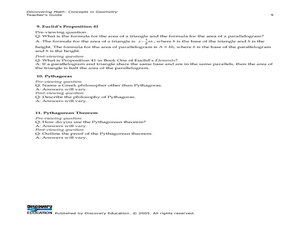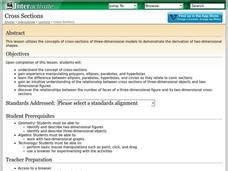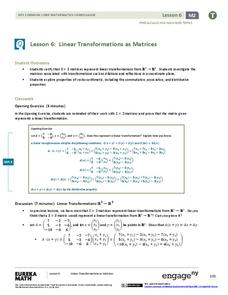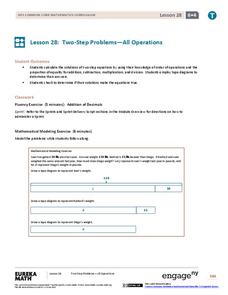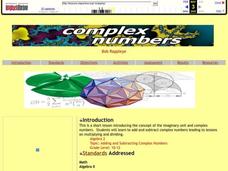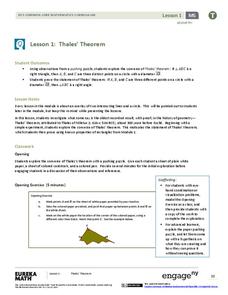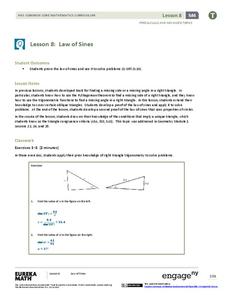Curated OER
Parallel Lines and Properties of Slope
Young scholars define functions to be graphed using the Y=key. They demonstrate how to set up a standard viewing screen using Zoom 6. They discuss and explore mathematical questions on a worksheet.
Curated OER
Discovering Math: Concepts in Geometry
Middle and high schoolers explore the concept of proving the Pythagorean Theorem. They research proofs of the Pythagorean Theorem. Pupils create posters of proofs, and research Greek mathematicians.
Curated OER
Properties of Trigonometric Functions
In this properties of trigonometric functions worksheet, students complete 4 sections consisting of 15 problems involving problem solving using Pythagorean and trigonometric identities and sketching functions..
EngageNY
Solving Inequalities
Do properties of equations hold true for inequalities? Teach solving inequalities through the theme of properties. Your class discovers that the multiplication property of equality doesn't hold true for inequalities when multiplying by a...
EngageNY
Matrix Multiplication Is Distributive and Associative
Learn the ins and outs of matrix multiplication. After discovering the commutative property does not apply to matrix multiplication in a previous instructional activity in the series, pupils now test the associative and distributive...
EngageNY
Triangle Congruency Proofs (part 1)
Can they put it all together? Ninth graders apply what they know about proofs and triangle congruence to complete these proofs. These proofs go beyond the basic triangle congruence proofs and use various properties, theorems, and...
Curated OER
Iron For Breakfast
Third graders are challenged to use scientific thinking, they experiment and observe which objects are attracted to a magnet. Pupils use the evidence to construct an explanation as to what common property the objects attracted to a...
Shodor Education Foundation
Cross Sections
Use this activity on cross-sections of three-dimensional shapes in your math class to work on algebra or geometry Common Core standards. The instructional activity includes a list of relevent terminology, and a step-by-step process to...
Shodor Education Foundation
An Introduction To Quadrilaterals
Young geometers investigate and apply properties of quadrilaterals. After a review and discussion of key terms, young scholars use a computer applet to explore four-sided figures and classify them according to their attributes. The...
Illustrative Mathematics
Alike or Different Game
How are a circle and triangle alike? How are they different? These are the types of questions children will answer while playing this fun geometry game. Including a variety of conventional and unconventional shapes, this activity allows...
EngageNY
Linear Transformations as Matrices
Don't stop with two-dimensional learning, go to the next dimension! Learners verify that 3x3 matrices represent linear transformations in the third dimension. Additionally, they verify the algebraic properties that extend to vector...
EngageNY
Two-Step Problems—All Operations
Step 1: Use the resource. Step 2: Watch your class become experts in solving two-step problems. Scholars learn to solve two-step word problems in context. They use tape diagrams and algebraic techniques to break the problem into two,...
EngageNY
Triangle Congruency Proofs (part 2)
Looking to challenge your students that have mastered basic triangle congruence proofs? A collection of proofs employ previously learned definitions, theorems, and properties. Pupils draw on their past experiences with proofs to...
Curated OER
Complex Numbers
Learners are introduced to the concept of imaginary unit and complex numbers. They are taught how to add and subtract complex numbers. Students define a complex number. They comprehend at least two applications of complex numbers....
Curated OER
Supplementary, Complementary, and Vertical Angles
By using circles that they cut out and label themselves, learners literally "get a grip" on the angles they identify: supplementary, complementary, and vertical. They solve missing measurements based on properties of supplementary,...
EngageNY
Thales’ Theorem
Isn't paper pushing supposed to be boring? Learners attempt a paper-pushing puzzle to develop ideas about angles inscribed on a diameter of a circle. Learners then formalize Thales' theorem and use geometric properties to develop a proof...
EngageNY
Base Angles of Isosceles Triangles
Build confidence in proofs by proving a known property. Pupils explore two approaches to proving base angles of isosceles triangles are congruent: transformations and SAS. They then apply their understanding of the proof to more complex...
EngageNY
Law of Sines
Prove the Law of Sines two ways. The ninth segment in a series of 16 introduces the Law of Sines to help the class find lengths of sides in oblique triangles. Pupils develop a proof of the Law of Sines by drawing an altitude and a second...
Curated OER
Lesson Design Protocol: Add and Subtract
Addition and subtraction are studied in this math lesson. Upper graders add and subtract whole numbers up to 1,000 with and without regrouping.
Curated OER
Complex Numbers
The class practices, on paper and/or on a TI graphing calculator the concepts of how to add, multiply, divide and subtract complex numbers using the correct property.
Curated OER
Sorting Candy
Lower graders sort and group objects by their different properties. They watch a video about sorting then, sort and organize candy in different groups. Students compare how others sorted their candy. Finally, they decide which group has...
Illustrative Mathematics
Introduction to Linear Functions
Introduce your algebra learners to linear and quadratic functions. Learners compare the differences and relate them back to the equations and graphs. Lead your class to discussions on the properties of a function or a constant slope...
EngageNY
Computing Actual Lengths from a Scale Drawing
The original drawing is eight units — how big is the scale drawing? Classmates determine the scale percent between a scale drawing and an object to calculate the length of a portion of the object. They use the percent equation to find...
Curated OER
Clinometer
Seventh graders build their own Clinometer and using the tangent of angles, estimate the height of trees. Then these students develop and lesson to show whole class and determine the tallest tree on school property.
Other popular searches
- Mathematical Properties
- Math Properties
- Math Properties of Addition
- Powerpoint Math Properties
- Addition Properties in Math
- Math Addition Properties
- Mental Math Properties
- 4 Mathematical Properties
- Math Properties Games
- Pictures of Math Properties
- Elementary Math Properties
- Math Properties Projects

